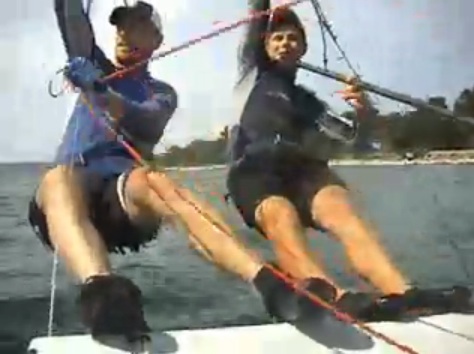Justin Chisholm sat down with British 49er crew Peter Greenhalgh in the days following his win, along with helm Chris Draper, at the 2010 49er Europeans. The win had been a big confidence boost for the British pair after a disappointing sixth for them at the World Championship in the Bahamas at the beginning of the year. Justin started by asking Peter to highlight what they had learned from the World’s experience and what changes they had made in the lead up to the Europeans? Peter believes that much of the issues they faced at the Worlds were down to communication and temperament.
‘Basically at the Worlds we were in a high-pressure situation for a number of reasons. We had identified this regatta as one we wanted to peak at and get a podium result. The conditions were very tricky with forty-degree wind shifts and pressure differences across the course of up to ten knots. You could go from eighth to eighteenth very quickly. Of course that was the same for everyone but what we struggled with was dealing with the loss situations mentally.
It’s hard to just shrug when you have been leading comfortably and then ten boats cross your bow, but that’s exactly what you have to do – just take it and reset then get on with the rest of the race. Chris in particular let himself get very stressed by the fact that we were losing boats, even though we knew that everyone was losing boats at some point. After the event we identified that as an area for work.’
So what specifically had they done to put this right?
‘We basically just eliminated all of the wasted negative chat and thought processes. When you race in a regatta in those conditions, which can happen anywhere, you just have to accept that you are going to have some deep results. That’s just how it is. Recognising that is pretty key and we were coping a lot better at the Europeans. Rather than having to resort to stomping his feet and then have me distracted trying to clam him down, Chris was able to just say things like “OK. Gone a bit wrong here. There’s going to be five or six boats crossing our bow.’’ That meant I was able to focus on giving the input he needs to get us back on track. We talked a lot about re-adjusting the goals. For example day one can often be the trickiest day, as you want to start the regatta strongly. Truth is though even though you might be aiming for fifteen points from three races, if you actually come out with thirty, its still not a disaster and definitely something you can recover from when you are sailing seventeen or so races in a regatta.’
Peter also believes that he and Chris now debrief a good deal more and possibly more critically.
‘We analyse what we are communicating a lot more to try and make sure the content is good. In certain conditions, some information is actually bloody useless, but in other conditions that info is absolutely critical. So it’s about me being able to ask the right questions in the right situations and both of us being able to highlight the priorities for the difficult conditions and the priorities for the easy conditions.’
So would they at the start of day one at a new venue say something like “OK this is a light and shifty day so we know what mode we have to set our minds and how to set our expectations?”
‘That’s exactly what we do. But if things change we have to be able to adapt quickly too. When it goes from blowing a gale to medium conditions, we have to be able to quickly zone in one what is now important and what is now not. Trying to get around the racecourse without capsizing is no longer a problem, but trying to keep the waves from coming over the bow because the wind has dropped suddenly really is. Power up the rig and keep the boat driving so we can look around and make good tactical decisions.’

 Croatian Olympic 49er team, Pavle Kostov and Petar Cupac, demonstrate wire to wire tacking and gybing...
Croatian Olympic 49er team, Pavle Kostov and Petar Cupac, demonstrate wire to wire tacking and gybing...
